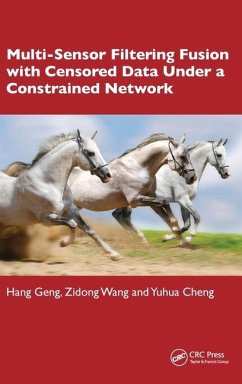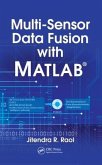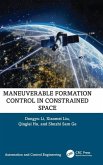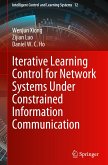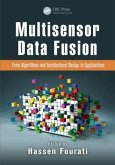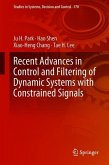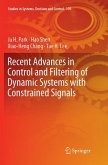Hang Geng, Zidong Wang, Yuhua Cheng
Multi-Sensor Filtering Fusion with Censored Data Under a Constrained Network Environment
Hang Geng, Zidong Wang, Yuhua Cheng
Multi-Sensor Filtering Fusion with Censored Data Under a Constrained Network Environment
- Gebundenes Buch
- Merkliste
- Auf die Merkliste
- Bewerten Bewerten
- Teilen
- Produkt teilen
- Produkterinnerung
- Produkterinnerung
This book presents the up-to-date research developments and novel methodologies on Multi-sensor filtering fusion (MSFF) for a class of complex systems subject to censored data under a constrained network environment.
Andere Kunden interessierten sich auch für
![Multi-Sensor Data Fusion with MATLAB® Multi-Sensor Data Fusion with MATLAB®]() Jitendra R. RaolMulti-Sensor Data Fusion with MATLAB®260,99 €
Jitendra R. RaolMulti-Sensor Data Fusion with MATLAB®260,99 €![Data-Rate-Constrained State Estimation and Control of Complex Networked Systems Data-Rate-Constrained State Estimation and Control of Complex Networked Systems]() Licheng WangData-Rate-Constrained State Estimation and Control of Complex Networked Systems175,99 €
Licheng WangData-Rate-Constrained State Estimation and Control of Complex Networked Systems175,99 €![Maneuverable Formation Control in Constrained Space Maneuverable Formation Control in Constrained Space]() Dongyu LiManeuverable Formation Control in Constrained Space218,99 €
Dongyu LiManeuverable Formation Control in Constrained Space218,99 €![Iterative Learning Control for Network Systems Under Constrained Information Communication Iterative Learning Control for Network Systems Under Constrained Information Communication]() Wenjun XiongIterative Learning Control for Network Systems Under Constrained Information Communication104,99 €
Wenjun XiongIterative Learning Control for Network Systems Under Constrained Information Communication104,99 €![Multisensor Data Fusion Multisensor Data Fusion]() Multisensor Data Fusion215,99 €
Multisensor Data Fusion215,99 €![Recent Advances in Control and Filtering of Dynamic Systems with Constrained Signals Recent Advances in Control and Filtering of Dynamic Systems with Constrained Signals]() Ju H. ParkRecent Advances in Control and Filtering of Dynamic Systems with Constrained Signals104,99 €
Ju H. ParkRecent Advances in Control and Filtering of Dynamic Systems with Constrained Signals104,99 €![Recent Advances in Control and Filtering of Dynamic Systems with Constrained Signals Recent Advances in Control and Filtering of Dynamic Systems with Constrained Signals]() Ju H. ParkRecent Advances in Control and Filtering of Dynamic Systems with Constrained Signals104,99 €
Ju H. ParkRecent Advances in Control and Filtering of Dynamic Systems with Constrained Signals104,99 €-
-
-
This book presents the up-to-date research developments and novel methodologies on Multi-sensor filtering fusion (MSFF) for a class of complex systems subject to censored data under a constrained network environment.
Hinweis: Dieser Artikel kann nur an eine deutsche Lieferadresse ausgeliefert werden.
Hinweis: Dieser Artikel kann nur an eine deutsche Lieferadresse ausgeliefert werden.
Produktdetails
- Produktdetails
- Verlag: CRC Press
- Seitenzahl: 264
- Erscheinungstermin: 26. August 2024
- Englisch
- Abmessung: 240mm x 161mm x 19mm
- Gewicht: 564g
- ISBN-13: 9781032555508
- ISBN-10: 1032555505
- Artikelnr.: 70151177
- Herstellerkennzeichnung
- Libri GmbH
- Europaallee 1
- 36244 Bad Hersfeld
- gpsr@libri.de
- Verlag: CRC Press
- Seitenzahl: 264
- Erscheinungstermin: 26. August 2024
- Englisch
- Abmessung: 240mm x 161mm x 19mm
- Gewicht: 564g
- ISBN-13: 9781032555508
- ISBN-10: 1032555505
- Artikelnr.: 70151177
- Herstellerkennzeichnung
- Libri GmbH
- Europaallee 1
- 36244 Bad Hersfeld
- gpsr@libri.de
Hang Geng received the B.Sc. degree in electronic information engineering in 2011 from Civil Aviation Flight University of China, the M.Sc. degree in electrical engineering and the Ph.D. degree in control science and engineering in 2014 and 2017, respectively, from Northwestern Polytechnical University. He is currently an Associate Professor at the School of Automation Engineering, University of Electronic Science and Technology of China. He was a visiting Ph.D. candidate (2015¿2016) and a Research Fellow (2019¿2022) with the Department of Computer Science, Brunel University London, UK. From 2018 to 2019, he was a Post- Doctoral Fellow with the Department of Mechanical Engineering, University of Kansas, USA. His research interests include information fusion, fault diagnosis, and state estimation. Dr. Geng is currently serving an Associate Editor for CMES-Computer Modeling in Engineering & Science, a member of IEEE, a Senior Member of China Instrument and Control Society, a Member of Chinese Association of Automation, and a very active reviewer for many international journals. Zidong Wang is Professor of Dynamical Systems and Computing at Brunel University London, West London, United Kingdom. He was born in 1966 in Yangzhou, Jiangsu, China. He received the BSc degree in Mathematics in 1986 from Suzhou University, Suzhou, the MSc degree in Applied Mathematics in 1990 and the PhD degree in Electrical and Computer Engineering in 1994, both from Nanjing University of Science and Technology, Nanjing. Professor Wang's research interests include dynamical systems, signal processing, bioinformatics, control theory and applications. He has published more than 600 papers in refereed international journals. He was awarded the Humboldt research fellowship in 1996 from Alexander von Humboldt Foundation, the JSPS Research Fellowship in 1998 from Japan Society for the Promotion of Science, and the William Mong Visiting Research Fellowship in 2002 from the University of Hong Kong. He was a recipient of the State Natural Science Award from the State Council of China in 2014 and the Outstanding Science and Technology Development Awards (once in 2005 and twice in 1997) from the National Education Committee of China. Yuhua Chen received the Ph.D. degree in instrumentation science and technology in 2007 from Sichuan University. He is currently a Professor of instrument science and technology at the School of Automation Engineering, University of Electronic Science and Technology of China. From 2013 to 2014, he was a Guest Researcher at the University of Toronto, Canada. His research interests include electronic instrumentation, imaging/sensing for nondestructive evaluation, intelligent prognostics and health management of complex systems, and numerical modeling and simulation. Professor Cheng is currently serving as an Associate Editor for Neurocomputing and IEEE Transactions on Instrumentation and Measurement, and a very active reviewer for many international journals.
1.Introduction 2. Optimal Filtering for Networked Systems with Channel Fading and Measurement Censoring 3. Tobit Kalman Filter with Time
Correlated Multiplicative Sensor Noise Under Redundant Channel Transmission 4. State Estimation Under Non
Gaussian Lévy and Time
Correlated Additive Sensor Noise 5. Protocol
Based Filter Design Under Integral Measurement and Probabilistic Sensor Failure 6. Distributed Filtering Fusion over Packet
Delaying Networks Subject to Censored Data 7. Federated Filtering Fusion with Dead
Zone
Like Censoring and Dynamical Bias Under Round
Robin Protocol 8. Multi
Sensor Filtering Fusion with Parametric Uncertainty and Measurement Censoring 9. Protocol
Based Filtering Fusion for State
Saturated Systems with Dead
Zone
Like Censoring Under Deception Attacks 10. Variance
Constrained Filtering Fusion for Nonlinear Cyber
Physical Systems Under Stochastic Communication Protocol 11. Conclusion and Furture Topics
Correlated Multiplicative Sensor Noise Under Redundant Channel Transmission 4. State Estimation Under Non
Gaussian Lévy and Time
Correlated Additive Sensor Noise 5. Protocol
Based Filter Design Under Integral Measurement and Probabilistic Sensor Failure 6. Distributed Filtering Fusion over Packet
Delaying Networks Subject to Censored Data 7. Federated Filtering Fusion with Dead
Zone
Like Censoring and Dynamical Bias Under Round
Robin Protocol 8. Multi
Sensor Filtering Fusion with Parametric Uncertainty and Measurement Censoring 9. Protocol
Based Filtering Fusion for State
Saturated Systems with Dead
Zone
Like Censoring Under Deception Attacks 10. Variance
Constrained Filtering Fusion for Nonlinear Cyber
Physical Systems Under Stochastic Communication Protocol 11. Conclusion and Furture Topics
1.Introduction 2. Optimal Filtering for Networked Systems with Channel Fading and Measurement Censoring 3. Tobit Kalman Filter with Time
Correlated Multiplicative Sensor Noise Under Redundant Channel Transmission 4. State Estimation Under Non
Gaussian Lévy and Time
Correlated Additive Sensor Noise 5. Protocol
Based Filter Design Under Integral Measurement and Probabilistic Sensor Failure 6. Distributed Filtering Fusion over Packet
Delaying Networks Subject to Censored Data 7. Federated Filtering Fusion with Dead
Zone
Like Censoring and Dynamical Bias Under Round
Robin Protocol 8. Multi
Sensor Filtering Fusion with Parametric Uncertainty and Measurement Censoring 9. Protocol
Based Filtering Fusion for State
Saturated Systems with Dead
Zone
Like Censoring Under Deception Attacks 10. Variance
Constrained Filtering Fusion for Nonlinear Cyber
Physical Systems Under Stochastic Communication Protocol 11. Conclusion and Furture Topics
Correlated Multiplicative Sensor Noise Under Redundant Channel Transmission 4. State Estimation Under Non
Gaussian Lévy and Time
Correlated Additive Sensor Noise 5. Protocol
Based Filter Design Under Integral Measurement and Probabilistic Sensor Failure 6. Distributed Filtering Fusion over Packet
Delaying Networks Subject to Censored Data 7. Federated Filtering Fusion with Dead
Zone
Like Censoring and Dynamical Bias Under Round
Robin Protocol 8. Multi
Sensor Filtering Fusion with Parametric Uncertainty and Measurement Censoring 9. Protocol
Based Filtering Fusion for State
Saturated Systems with Dead
Zone
Like Censoring Under Deception Attacks 10. Variance
Constrained Filtering Fusion for Nonlinear Cyber
Physical Systems Under Stochastic Communication Protocol 11. Conclusion and Furture Topics

